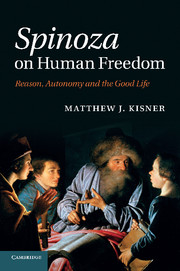Book contents
- Frontmatter
- Contents
- Abbreviations and translations
- Acknowledgments
- Introduction: Beyond therapy
- 1 Freedom as rationality
- 2 Justifying Spinoza's conception of freedom
- 3 Autonomy and responsibility
- 4 Freedom and happiness
- 5 The good
- 6 The natural law
- 7 Benevolence
- 8 The free man
- 9 Rational deliberation
- 10 The character of freedom
- 11 The freedom of the citizen
- Conclusion: “The true freedom of man”
- Bibliography
- Index
10 - The character of freedom
Published online by Cambridge University Press: 01 March 2011
- Frontmatter
- Contents
- Abbreviations and translations
- Acknowledgments
- Introduction: Beyond therapy
- 1 Freedom as rationality
- 2 Justifying Spinoza's conception of freedom
- 3 Autonomy and responsibility
- 4 Freedom and happiness
- 5 The good
- 6 The natural law
- 7 Benevolence
- 8 The free man
- 9 Rational deliberation
- 10 The character of freedom
- 11 The freedom of the citizen
- Conclusion: “The true freedom of man”
- Bibliography
- Index
Summary
When we are rational, employing the deliberative processes described in the previous chapter, how, according to Spinoza, do we act? As I have argued, we cannot fully answer this question by taking an inventory of reason's practical guidance, since how we interpret and apply it depends on the particular situation. It is not surprising, then, that Spinoza's most developed views on rational action are contained in his account of the virtuous character, which indicates general rational dispositions and tendencies in action. This chapter explains Spinoza's understanding of this character, what he calls “fortitudo” (3p59s), usually translated as “strength of character.” I argue that the virtuous character should be understood as affective dispositions to act, arising from adequate ideas representing our good. Since these ideas are also the source of the natural law, these tendencies can be understood as the dispositions to follow the natural law. A central conclusion of this chapter is that our passivity plays a central role in Spinoza's understanding of the virtuous character. This is because we develop the virtuous character by using reason to direct natural tendencies, which arise from our dependence on external things, namely the tendencies to seek joy and to please others. It follows that Spinoza's account of the virtuous character indicates how necessarily passive beings should implement reason's guidance, thereby providing a picture of living, human freedom.
- Type
- Chapter
- Information
- Spinoza on Human FreedomReason, Autonomy and the Good Life, pp. 197 - 214Publisher: Cambridge University PressPrint publication year: 2011



